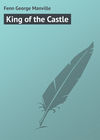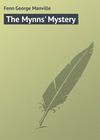Читать книгу: «Fix Bay'nets: The Regiment in the Hills», страница 22
Chapter Thirty Six
How the Fort was saved
It was on the third morning after Bracy and Gedge had been with the Ghoorkhas, who were in camp in a natural stronghold of the upper valley, resting before making their final advance to the fort. Gedge, with his arm in a sling, and a frost-bitten foot, which made him limp about the little tent they shared by the doctor’s orders, was looking anxiously down at his officer, who lay perfectly helpless, appearing terribly thin and worn, but with a bright look in his eyes, which augured well for his recovery.
“Yes, sir; you look a deal better,” said Gedge in answer to a question: “and, of course, the doctor ought to know; but I don’t think you ought to be so weak.”
“Wasn’t it enough to make me weak, my lad?” said Bracy in a faint voice. “Why, I have hardly a drop of blood left in my body.”
“Course not, sir; and you do eat and sleep well.”
“Yes, my lad; and if we can only cut our way through these swarming wretches, and relieve the fort before it is too late, I shall soon begin to mend. It is horrible, this delay, and no news.”
“No news, sir?” said Gedge, staring. “Didn’t the doctor tell you?”
“The doctor? I have not seen him this morning.”
“But he’s been here, sir. He said you were in such a beautiful sleep that you warn’t to be woke up, for it was doing you no end of good.”
“But he said something?” said Bracy anxiously. “Have we had news?”
“Tip-top, sir. One of the little Ghoorkha chaps got back soon after daylight – one of the three that was sent different ways.”
“But the news?”
“He got into the fort, sir, and brought a despatch from the Colonel.”
“Yes, yes,” said Bracy breathlessly.
“They was all well, but hard up for everything, ’speshly ammynition; but they could hold out for three days; and as soon as we come up he’s going to make a sally and attack the Dwats in the rear. – Oh, sir, it is hard, and no mistake!”
“Thank Heaven!” cried Bracy softly. “There, my lad, I can lie and rest now.”
“Yes, sir, that’s the worst of it.”
“It is hard – the worst of it?” said Bracy wonderingly. “What do you mean?”
“You and me, sir, having to lie up and be out of all the fun.”
“Oh, I see,” said Bracy, smiling, and with the careworn look seeming to die out of his thin face. “Well, I think we have done our share.”
“Did you hear the firing last night?”
“I? No. Was there an attack?”
“A big un, sir; but the enemy was driven back everywhere, and left a lot of dead behind. I never see such fellows as these little Ghoorkha chaps is to fight.”
“If they can only cut their way through to the fort, Gedge, there will be nothing then to fear, for Colonel Graves will hold the place, against any number that can be brought against it.”
“And they will, sir,” cried Gedge proudly; “nothing can stop ’em. They’ve got so much dash and go in ’em. There’s going to be a big fight to-day, for the hills seem dotted with white-coats as far as you can see; and in an hour’s time I hear we’re to advance, so as to get the job done before it’s dark.”
Gedge’s news was correct: and in an hour the column was in motion, the order coming to advance in skirmishing order, with ample supports, and no following up of the enemy was to be attempted, the sole object, being to reach the fort before night, and trust to the future for giving adequate punishment for all that had been done.
The orders of the officers were splendidly carried out, and the gallant regiment advanced along the right bank of the river as fast as the front was cleared, but at a severe cost, for the hills and patches of forest and rock swarmed with the enemy, and but for the abundance of cover the attempt must have failed. But by a series of rushes and their deadly fire the brave little fellows won their way on till well into the afternoon, when farther progress seemed impossible, the enemy’s leader holding a patch of cedar forest most determinedly with a dense body of men. All this Bracy knew, for Gedge, in spite of his wound, was active enough, and kept his officer well furnished with accounts of their progress; but his face looked grave as, in obedience to Bracy’s question, he told him all.
“Yes, sir,” he said, “we’re in a very tight place; and the Colonel here is looking a bit down in the mouth. The little chaps are raging about being kept back, and if he’d let ’em go they’d kill till they couldn’t lift those head-choppers of theirs; but as soon as one’s shot or cut down a dozen seems to spring up, and the place swarms with white-gownds, as if they’d quite made up their minds to kill us to a man before we can get to the fort. There, sir – hear that?”
“Yes, I hear,” said Bracy, breathing hard. “It means an attack on the rear.”
“That’s it, sir. We’re surrounded; and if it weren’t for that rushing river being so full they’d come swarming over, and we should be done.”
Further conversation was put an end to by the order to advance, after a brief halt to rest and refresh the men, the Ghoorkha Colonel seeing that the enemy must be dislodged from the forest in front at any cost. It was a desperate business, and could only be achieved at a terrible loss, for the river and precipitous rocks on either side put a stop to all idea of turning the enemy’s flank. A bold dash was the only chance, and this was about to be attempted, while the rear of the regiment was being terribly harassed by the enemy closing in.
The last arrangements had been made, and the swarthy little fellows, so long held in by the tight rein, were trembling with excitement as they stood together in shelter, with fixed bayonets and kukris, waiting to make the rush. The bugle was being raised to the holder’s lips to sound the advance, when a thrill of joy surged through the British leaders’ breasts, for the help they needed came in the nick of time.
A sharp volley was fired from behind the dense patch the enemy was holding, and the Ghoorkhas cheered wildly as the bugle rang out; and then as volley after volley followed from beyond the trees they literally flew over the broken ground, not a man stopping to fire, but raced into the wood, hewing with their terrible knives, and driving the enemy out like a flock of sheep right on to the fire, and soon after upon the bayonets of Colonel Graves’s men. It was only a matter of ten minutes, and then, fleeing to right and left, the enemy was springing up among the rocks or plunging into the river to escape the tierce little regiment they had sought to destroy.
Ill news flies swiftly, and the sight of their fellows streaming scattered up among the hills disheartened those who were making a savage attack upon the rear. A couple of volleys from the two companies who formed the rear-guard turned their hesitation into flight, and amidst tremendous cheering the advance was continued, with Colonel Graves’s men clearing the way; and, merely harassed by a few distant shots, the column readied the fort whose walls were lined by non-combatants, women, and the weak garrison left behind. The men marched in cheering and counter-cheering, intoxicated as they were with success, while even the wounded carried on litters and mules, and the brave fellows who persisted in tramping on in spite of injuries terrible to bear, added their feeble cries to swell the jubilation of the scene.
But the wildest, most exciting moments were when, in the bright evening glow, the rear-guard of the little Ghoorkhas marched in, proud of two burdens they carried shoulder-high in litters, singing and cheering and waving their caps, as if they bore the greatest triumph of the relief.
One of those they carried lay prone and helpless, his sallow face quivering slightly from time to time with the emotion which attacked him as he was borne into the court – most painfully perhaps when his face was recognised by those at the windows of the buildings and on the walls. It was then that his name was shouted, first by shrill women’s voices, and then thundered out and half-drowned by the cheers.
The other burden carried by the brave little Ghoorkhas would not lie, but insisted upon sitting; and somehow, in the midst of the wild excitement of their reception as the heroes who had brought back the help, Gedge seemed to go quite mad with boy-like joy. For as soon as he appeared, bandaged and damaged as he was, Mrs Gee called out his name. A burst of fresh cheering arose then from the men of his company who were near, and as their shouts arose and were echoed by those around, “Bill Gedge! Bill Gedge!” the poor fellow sat up as high as he could upon the little Ghoorkas’ shoulders, threw himself into one of his favourite nigger minstrel attitudes, with left arm outstretched and right hand seeming to thump with all his poor strength upon the imaginary banjo held against his breast.
“Welcome, welcome back!” cried Colonel Graves a few minutes later, as he forced himself through the crowd to where Doctor Morton was excitedly superintending the carrying in of his two old patients to the officers’ ward.
“Thanks, thanks, Colonel,” said Bracy in a feeble voice. “I did my best, sir, but I only failed.”
“Failed!” cried the Colonel proudly. “Why, the fort is saved.”
Chapter Thirty Seven
“For Valour.”
There is little more to tell, for, after this last repulse and the strengthening of the but by doubling its garrison, the enemy’s ranks melted away once more, the white-coats, terribly lessened, vanishing like snow from the hills.
Two days later long processions of unarmed villagers were bringing in stores for sale; and before twenty-four more hours had elapsed a deputation of chiefs from different tribes were suing for peace, the Empress Queen’s authority being acknowledged, and the fort and its approaches became safe, so that it seemed hard to realise the truth of the great change. But change there was, the various hill-tribes round apparently accepting the position of being under the stronger power, and devoting themselves to the arts of peace.
It was while getting slowly over his injuries that Bracy’s quarters became the favourite resort of many of the officers, even Colonel Wrayford, once more himself, often coming in company with Major Graham and the Doctor. But the chief visitors were Roberts and Drummond, the three young officers exchanging notes as to what had taken place during their separation.
“I never knew such a lucky chap as you are, Bracy,” said Drummond on one occasion. “You seem to get most of the titbits and all the fat.”
Bracy’s face assumed such a peculiar aspect of perplexed wonder as he carefully shifted his injured leg so as not to jar his wound while moving, and he directed such a questioning look at Roberts that the latter burst into a roar of laughter.
“What is it?” said Drummond. “Have I said something stupid – a bull?”
“More like the bleat of an innocent calf,” said Roberts – “eh, Bracy?”
“Oh, all right; chaff away, old chaps. But, I say, I hear that there are a lot of supplies coming up the pass – mule-loads and loads. There’s sure to be a bullock-trunk for me, and I shall be able to get out of you fellows’ debt.”
“Our debt?” said Bracy. “You don’t owe me anything.”
“Oh, don’t I? What about those boots?”
One morning, when Bracy was getting on towards convalescence, Gedge, who was acting as invalid servant, entered the homely room holding out one arm.
“Why, Gedge!” cried Bracy; “the sergeant’s chevrons?”
“That’s right, sir,” cried their owner proudly. “Youngest sergeant in the ridgement, Colonel says, and that he was proud to give me my promotion.”
The young soldier held out his arm, upon which the regimental tailor had sewn a patch of very shabby cloth, bearing the three stripes of the sergeant’s rank, the thing itself being a weather-stained rag.
“I congratulate you, my lad, with all my heart.”
“I knew you would, sir. Ain’t much to look at, sir, to some people. We shall get fresh togs served out some day; but I don’t believe the noo stripes ’ll shine out half so bright as these here do, sir, to me.”
Bracy sighed.
“Can’t help feeling as proud as a dog with two tails – ought to say three, sir, because that’s the number of the stripes. But somehow I don’t feel as I thought I should.”
“I suppose not,” said Bracy sadly. “I feel the same, Gedge. We did not fetch the Ghoorkhas.”
“No, sir,” said Gedge, grinning; “but we brought ’em back, and I don’t see how any two could ha’ done more than we did. But I didn’t mean that, sir. I meant about Sergeant Gee. I thought it would make him as waxy as could be; but as soon as parade was over, and the boys had done cheering me for my promotion, I got showing off, for old Gee was coming up to me, and I was getting ready to give him back as good as he give me. But what d’yer think, sir?”
“I don’t know, Gedge,” said Bracy, smiling.
“Knocks the wind outer me at once.”
“What do you mean?”
“Comes up to me and offers me one hand, and claps t’other on my shoulder. ‘Glad to welcome so brave a brother,’ he says, ‘to the sergeants’ mess.’ My! I was took aback, sir, and couldn’t say a word; and if next minute his missus wasn’t shaking hands too with the tears in her eyes, sir – real uns, for I counted four as tumbled out and fell spat on the front of her dress. ‘Willyum Gedge,’ she says, and then she stops short with her lower lip dithering, and she couldn’t say another word, only stood shaking her head, while the boys cheered again. Think Sergeant Gee meant it, sir, or was it only showing off?”
“He meant it, my lad. Gee has a great deal of harsh tyranny in his ways of dealing with those under him; but a braver and more honest man never joined the regiment.”
“I’m glad o’ that, sir,” said Gedge. “Then, as he did mean it, why, of course we’re going to be friends.”
“Ah, Sergeant, you here?” said Colonel Graves, entering Bracy’s quarters. “One moment before you go. I have mentioned you in my despatch for displaying signal bravery in protecting your officer upon two occasions.”
“Me, sir? Oh, thanky, sir, but I – ”
“Silence! – Bracy, my dear boy, I came to tell you that I have spoken so of you that if they do not give you the Victoria Cross I shall say there is something wrong.”
“For me, sir?” cried Bracy, with his pale, thin face flushing faintly. “Impossible, sir. Oh, I have not deserved all this!”
The Colonel’s eyes did not look quite so bright as usual as he warmly shook his young officer’s hand.
“Let me be the best judge of that,” he said. “You have always been one of my smartest officers, and in this last dangerous expedition you showed the will and did your utmost. It was fate that helped you in the last extremity to perfect the deed.”
The day came when the simple little much-prized decoration was pinned on Captain Bracy’s breast, and the motto never shone upon a truer heart.
“For Valour,” he said softly as he looked down upon his breast. “Was it really well deserved?”





















